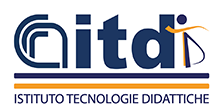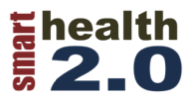Framework
Smart cities and communities and social innovations” PON RICERCA E COMPETITIVITA’ AVVISO N. 84/RIC dee 2/03/2013
Objectives
The "Smart Health 2.0" project is aimed to create a technological infrastructure on which to develop several innovative services with high added value to allow the activation of new models in the field of health and welfare. The results obtained from the research and experimental development (conceptual approaches, methodologies and prototypes), will be test in Calabria, Campania, Sicily and Puglia, in line with the interests expressed by Public Administrations involved in the trial.
Workplan
The ITD - Palermo participates in the design of the Electronic Health Record (ESF) and is co-responsible of the task 11 "Empowerment" and participate in the experimentation activity in Sicily. In detail, the ITD will: • define the methodology of medical training based on the use of the ESF, and planning the related services; • Develop a research report on the extension of the Personal Health Record; • define the methodology of citizens/patients empowerment based on the use of the ESF, design and develop the related services through web and mobile technologies.
Expected results
1. The innovative model of professional training of health personnel is based on the use of Electronic Health Record (ESF 2.0) and is completed by a set of tools that enable the implementation. The training model will allow the medical staff to update and acquire new knowledge and skills directly in their work environment through specific functions of communication and cooperation directly integrated into the ESF. The training methodology is defined is particularly effective in changing the professional services of health personnel, both in improving the quality of care provided to patients. In detail, the collaborative environment will allow the medical staff to: • record, integrate, update and retrieve bibliographic information, guidelines and documents relating to specific diagnostic and therapeutic issues and connect them to real cases on the ESF; • modify elements of a treatment in a causal network of events and episodes in order to define a base case model as the core for the creation of a "learning objects" to be able to share in a professional network; • communicate with other health professionals in order to facilitate the sharing of knowledge and experience. 2. The empowerment method of citizen/patient uses the Electronic Health Booklet (Lise) as an enabling tool. The concept of empowerment is based on the patient’s centrality and on his involvement in decision-making on issues relating to his health. Patient involvement have significant benefits, making it more aware of its capabilities, increasing its social contacts, improving his skills and knowledge related to diseases and to services offered by the national health system. The Lise is the tool that allows the empowerment of citizens taking advantage of the services offered by the 2nd generation ESF. The benefits of the Lise are immediate and allow citizens to dispose of their data anywhere, but especially to share the data with the doctor or other health professionals involved in the care pathway. The different information conveyed by Lise will enable analysis processes whose results can trigger information services and awareness of the patient on the specific risks faced by (check-up of risks), tips, advice and guidance.
 Italiano (Italia)
Italiano (Italia)  English (United Kingdom)
English (United Kingdom) 

